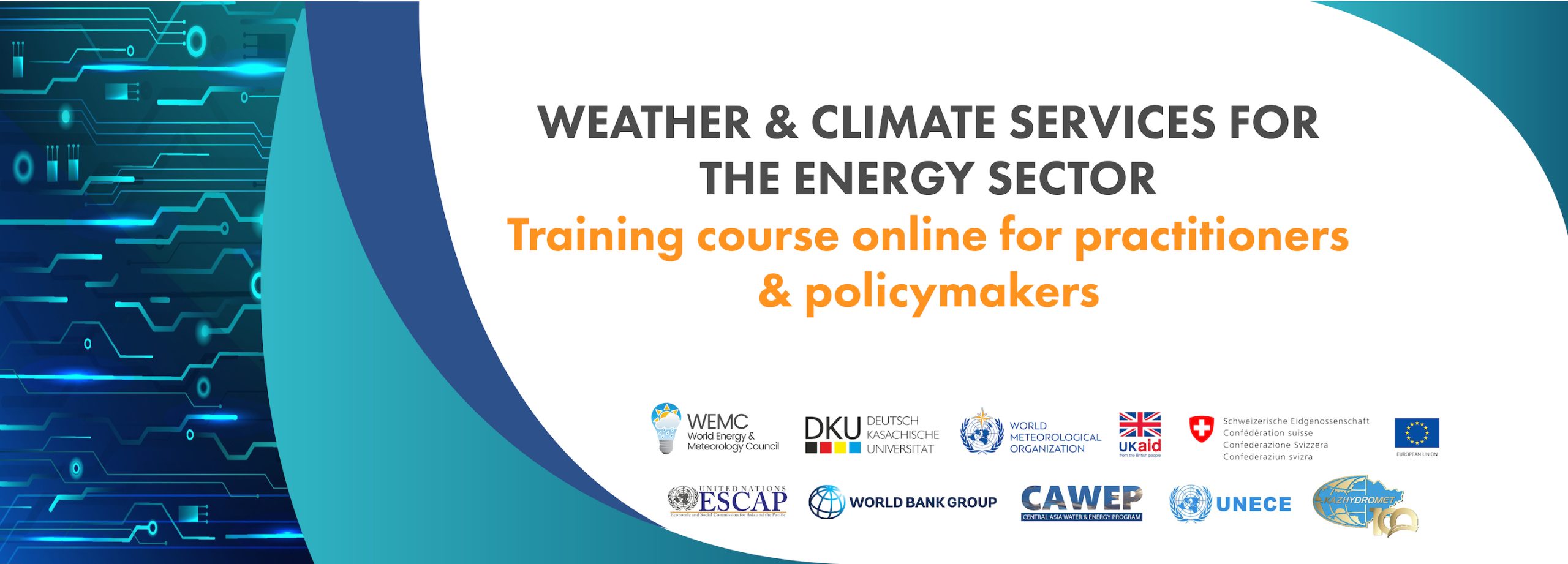Thank you to all that took part in the online weather and climate services for the energy sector in Central Asia training course for practitioners and policymakers. Our thanks go to the partners that contributed to the training course: the Kazakh-German University in Almaty (DKU), the World Energy & Meteorology Council (WEMC), the World Meteorological Organization (WMO), the World Bank (TWB), United Nations Economic Commission for Europe (UNECE), the Economic and Social Commission for Asia and the Pacific (ESCAP) and RSE “Kazhydromet” (KHM).
Through this course, participants learned about the impacts of weather and climate on energy systems, and their importance in ensuring effective and efficient uptake of renewable, clean energy sources. Participants acquired theoretical knowledge and practical tools to design and deliver their own weather and climate service, working in small teams. Hearing from leading experts, participants learnt about real-world applications of weather and climate services and best practice approaches to enhance their knowledge and build their capacity.
Why weather and climate services matter for energy management
| Weather and climate services for the energy sector (Watch here) | Laurent Dubus (RTE/WEMC) | Access the PDF here |
| Alberto Troccoli (WEMC/ICS) | Access the PDF here | |
| The energy sector in Central Asia: current status and emerging trends (Watch here) | Sergey Tulinov (ESCAP) | Access the PDF here |
| Iva Brkic (ESCAP) | Access the PDF here | |
| Panel: Weather and climate services for supporting energy transitions in Central Asia: local barriers and opportunities (Watch here) |
Jane Ebinger (WB) |
Access the PDF here |
| Alexey Kobzev (DKU) | Access the PDF here | |
| Asset Nauryzbayev (Expert) | Access the PDF here | |
| Ainur Sospanova (Independent Expert) | Access the PDF here |
What is needed for delivering weather and climate services
|
Good practice in delivering weather and climate services development for the energy sector (Watch here) |
Roberta Boscolo (WMO) and Chiara Cagnazzo (C3S) |
Access the PDF here |
|
Panel: National weather and climate services for the energy sector – the perspective of the National Hydrometeorological services in the region (Watch here) |
Alua Sakhanova (Kazhydromet) |
Access the PDF here |
|
Elena Akentyeva (GeoPhysical Obs) |
Access the PDF here |
|
|
Natalya Vasilenko (Kyrgyzhydromet) |
Access the PDF here |
|
|
Anvarsho Dorgayev (Tajikhydromet) |
Access the PDF here |
|
|
Kristian Horvath (Croatia Hydromet) |
Access the PDF here |
How to design a climate service
|
Collaborative approaches to weather and climate services (Watch here) |
Clare Goodess (UEA) |
Access the PDF here |
|
Weather and climate forecasting for energy applications in the region (Watch here) |
Sue Ellen Haupt (NCAR) |
Access the PDF here |
|
David Brayshaw (U of Reading) |
Access the PDF here |
Applying weather and climate services for the energy sector
|
Sources of weather and climate data for the energy sector: Copernicus C3S, the Global Solar and Wind Atlas (Watch here) |
Matteo DeFelice (JRC) |
Access the PDF here |
|
Jake Badger (DTU) |
Access the PDF here |
|
|
Case studies: applying climate services in the energy industry (Watch here) |
Altynay Zhapbasbayeva (Kazhydromet) |
Access the PDF here |
|
Dana Yermolyonok (GIZ) |
Access the PDF here |
|
|
Jose Alberto Zuniga Mora (ICE) |
Access the PDF here |
Applying weather and climate services for the energy and related sectors
|
Insurance and hedging for energy and agriculture (Watch here) |
Lukas Sundermann (Swiss Re) |
Access the PDF here |
|
Panel: Weather and climate services for risk management and net-zero infrastructure development (Watch here) |
Alma Zhukenova (Ministry of Energy of the Republic of Kazakhstan) |
Access the PDF here |
|
Laurent Dubus (RTE/WEMC) |
Access the PDF here |
|
|
Yuri Simonov (Roshydromet) |
Access the PDF here |
|
|
Vladislav Bizek (WECOOP) |
Access the PDF here |
‘The key to successful Weather and Climate Services is to keep an ongoing communication with users, via the CO-CO-CO approach, to overcome the complexity of the information and the level of accuracy of the forecasts’ – Alberto Troccoli
‘Climate services are key, and user-provider collaboration is essential to deliver user-driven & science-based information and services’ – Laurent Dubus
‘Tailor-made products have an exceptional value and are/will be increasingly absorbed by the energy sector – provided these are based on understanding of real needs of the national energy sector’ – Kristian Horvath

